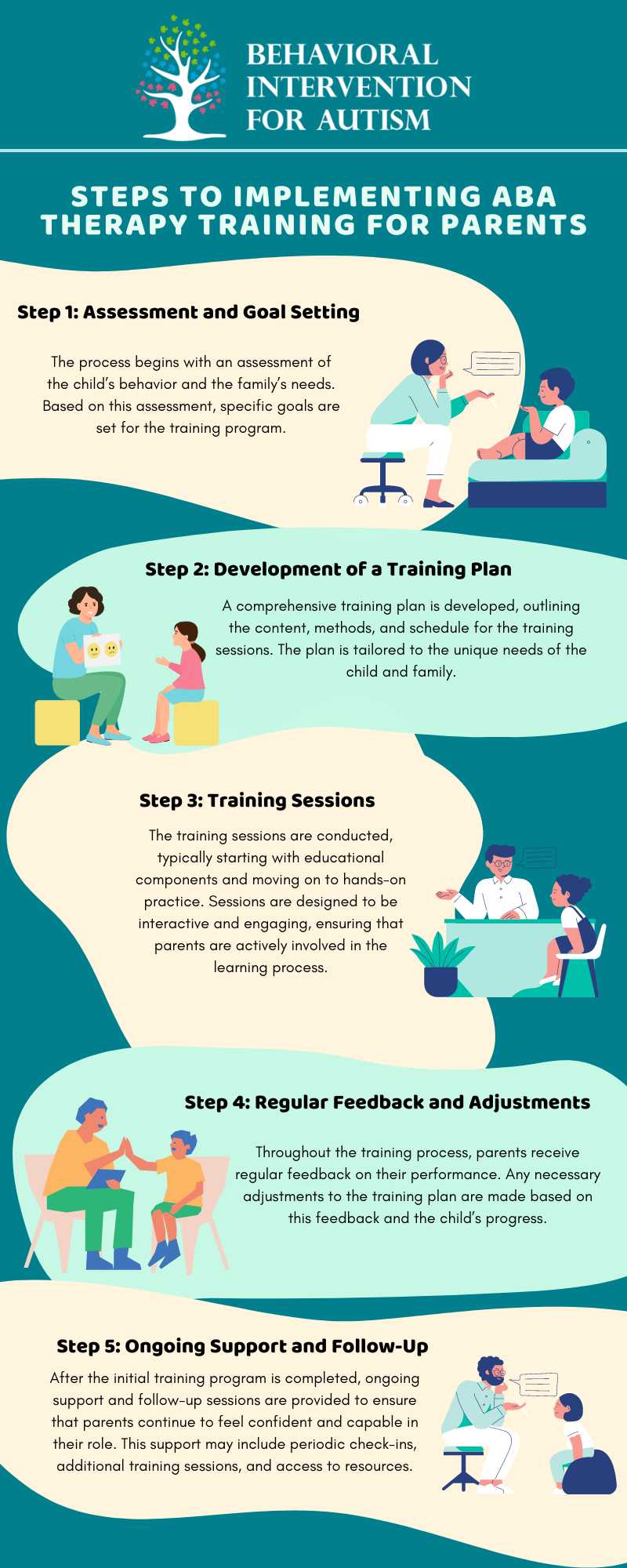
Table of Contents
Applied Behavior Analysis (ABA) therapy is a scientifically validated approach for helping individuals with autism and other developmental conditions. While ABA therapy is often administered by trained professionals, involving parents in the process is crucial for the therapy’s success. Parents play a vital role in reinforcing skills and strategies at home, where the child spends most of their time. This article delves into the significance of ABA therapy training for parents, the components of effective training programs, and how these programs empower families to support their child’s development.
The Importance of Parent Involvement in ABA Therapy
Parent involvement in ABA therapy is not just beneficial; it is essential. Parents who are actively involved in their child’s ABA therapy tend to show more significant improvements in communication, social skills, and behavior. One of the key reasons for this is the consistency and generalization of ABA therapy principles and strategies across various settings. Parents can help generalize the skills learned during therapy sessions to everyday situations at home and in the community, ensuring that the therapy’s impact is widespread and lasting.
Additionally, parents can provide immediate and appropriate reinforcement for desired behaviors, which is critical for skill acquisition and behavior modification. The prompt reinforcement helps solidify positive behaviors and reduces the occurrence of undesirable ones. Early intervention also plays a crucial role; parents who are trained in ABA techniques can begin implementing these strategies as soon as possible, maximizing the potential benefits for their child.
Moreover, while professional ABA therapy can be expensive, parent-led interventions offer a cost-effective solution. Parents can provide additional support without the high costs associated with continuous professional services, making therapy more accessible and sustainable for many families. In summary, parent involvement in ABA therapy enhances consistency, reinforcement, early intervention, and cost-effectiveness, all of which are pivotal for the therapy’s success and the child’s development.
Components of Effective ABA Therapy Training Programs for Parents
Effective ABA therapy training programs for parents typically include the following components:
1. Education on ABA Principles
Parents are introduced to the core principles of ABA, including positive reinforcement, behavior modification, and data collection. Understanding these principles is the foundation for implementing ABA strategies effectively.
2. Observation and Modeling
Parents observe ABA sessions conducted by professionals and learn by watching how therapists interact with their children. Therapists model-specific techniques and strategies, providing a visual and practical learning experience for parents.
3. Hands-On Practice
Parents are given opportunities to practice ABA techniques with their children under the supervision of a trained therapist. This hands-on practice is crucial for building confidence and competence in using ABA strategies.
4. Feedback and Support
Regular feedback from therapists helps parents refine their techniques and address any challenges they encounter. Ongoing support ensures that parents feel confident and capable of implementing ABA strategies effectively.
5. Customizable Training
Training programs should be tailored to meet the unique needs of each family. Customizable training ensures that parents learn strategies that are relevant to their child’s specific behaviors and developmental goals.
6. Behavior Management Strategies
Parents learn how to manage challenging behaviors effectively using ABA techniques. This includes understanding the functions of behavior, using antecedent interventions, and applying consequences appropriately.
7. Data Collection and Analysis
Parents are trained to collect and analyze data on their child’s behavior and progress. This information is critical for making informed decisions about the child’s therapy plan and measuring the effectiveness of interventions.
8. Communication Skills
Effective communication between parents and therapists is essential for successful collaboration. Training programs often include components that help parents communicate effectively with professionals and advocate for their child’s needs.
Steps to Implementing ABA Therapy Training for Parents
Implementing ABA therapy training for parents involves several key steps to ensure its effectiveness and sustainability:
Benefits of ABA Therapy Training for Parents
The benefits of ABA therapy training for parents are numerous and far-reaching. Firstly, it empowers parents by equipping them with the knowledge and skills necessary to support their child’s development effectively. This empowerment translates into improved child outcomes, as children whose parents are actively involved in their ABA therapy tend to show more significant improvements in behavior, communication, and social skills. Additionally, the process of working together towards common goals can strengthen the bond between parents and their children, fostering a stronger parent-child relationship.
Parents also gain increased confidence in their ability to manage challenging behaviors and support their child’s development. This training can lead to significant cost savings, as families can reduce the overall cost of therapy by supplementing professional ABA therapy with parent-led interventions. Finally, parent training ensures the sustainability of the benefits of ABA therapy over the long term, even if professional services are no longer available.
Challenges and Solutions in ABA Therapy Training for Parents
While the benefits of ABA therapy training for parents are clear, some challenges must be addressed. One major challenge is the time commitment; parents may struggle to find the time to attend training sessions and consistently implement ABA strategies. To address this, flexible scheduling and incorporating training into daily routines can be beneficial.
Emotional stress is another significant hurdle, as managing a child with ASD can be emotionally taxing, and adding training to the mix can increase stress. Providing emotional support and resources for stress management can help parents cope with these demands.
The complexity of ABA techniques can also pose difficulties, as these methods can be challenging to master. Simplifying training materials and offering clear, step-by-step instructions can make the learning process more manageable and accessible for parents. However, if there is a willingness to learn, parents can overcome these challenges if they have dedication and consistency in mind.
Conclusion
ABA therapy training for parents is a powerful tool that empowers families to support their child’s development effectively. By providing parents with the knowledge, skills, and confidence to implement ABA strategies, these training programs enhance the effectiveness of ABA therapy and promote positive outcomes for children with ASD. The involvement of parents in ABA therapy is not just beneficial; it is essential for the therapy’s success. As more families gain access to these valuable training programs, the potential for positive change and growth in children with ASD continues to expand. If you are interested in learning more about ABA therapy training for parents or ABA therapy in Florida, consider reaching out to Behavioral Intervention for Autism for expert guidance and support. Contact us today to book a session.
Sources:
https://online.regiscollege.edu/blog/aba-parent-training/
https://www.ncbi.nlm.nih.gov/pmc/articles/PMC6269398/
https://www.autismparentingmagazine.com/aba-therapy-training-benefits/
- 9 Common Obsessions of Children With Autism You Should Know - February 25, 2025
- What is Neurodiversity? A Guide to Embracing Differences - February 25, 2025
- Understanding Hyperfocus in Autism: What It Means and Why It Happens - February 25, 2025



